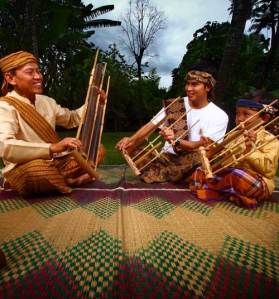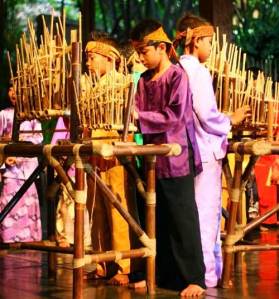 Angklung is a renowned musical instrument made of bamboo and its originated is West Java, Indonesia. In the early days, music played an essential part of ceremonial activities, especially in the harvest times. The sound of bamboos is believed will catch the attention of the goddess Sri – who will bring fertility to the plantation, and pass the joy and happiness for mankind.
Angklung is a renowned musical instrument made of bamboo and its originated is West Java, Indonesia. In the early days, music played an essential part of ceremonial activities, especially in the harvest times. The sound of bamboos is believed will catch the attention of the goddess Sri – who will bring fertility to the plantation, and pass the joy and happiness for mankind.The oldest Angklung in history that still exist is called Angklung Gubrag made in Jasinga, Bogor, and has reached 400 years of age. Nowadays, some of those older Angklung remain in Sri Baduga Museum, Bandung.
As the time flown by, Angklung is not only recognized throughout Indonesia, also, spreading to other Asian countries. In the late of 20th century, Daeng Soetigna created Angklung based on diatonic tone scale. Ever since then, Angklung has been used in entertainment business as well it is even able to play diverse genres of music. And In 1966, Udjo Ngalagena a student of Mr. Daeng Soetigna developed Angklung based on traditional Sundanese tone scale Salendro, Pelog and Madenda.
Current days, many contemporary and young musicians compose music through the brilliant sound of bamboo.
Definition
The word angklung taken from the way the instrument played and the sound that creates. The word it self come from sundanesse word “angkleung-angkleungan”. It refers to the movement of angklung player. And the sound of “klung” that produced. In linguistic term, angklung came from the word “angka” = tone, and “Lung” = broken. So Angklung refers to the broken tone, or uncompleted tone
Traditional Angklung in Indonesia
Angklung Buhun Phase (Aprrox 6 Century – 15 C)
Angklung Buhun (400 AD)
The spread of traditional Angklung by Sundanese Empire through diplomatic relation since 600 AD made Angklung famous outside Java, like Bali, Sumatera and Kalimantan . Angklung Buhun is a term of Angklung that hasn’t got any influence from any other culture elements [1]. Angklung Buhun used the pitch of Carang (Salendro) and Kerep (Pelog). Internationally, we call it pentatonic.. The head function of Angklung Buhun is a medium of farming ceremony (planting time and harvest time) It is believed that Angklung voice can make Dewi Sri (Goddess of rice crop) come to the earth that would give people blessing. The players of Angklung Buhun were only 9 males of above forty years old.
Angklung Badeng Phase ( 15 Century – 19 Century )
In 15th century, islam developed rapidly in Indonesia. art and culture, including Angklung, were the fast methods in spreading Islam . In 15th century, in Sanding Malangbong, Garut regency, Angklung art developed as a medium of spreading Islam .
Angklung Modern phase
Angklung Pa Daeng (1938 – now)
Daeng Soetigna first transform Indonesian Angklung from traditional pentatonic tone scale, become Diantonic Cromatic Tone Scale. The function of the Angklung is for education and enterntainment porpuses. He Simplify the shape of the angklung. A full set contain : angklung melody, angklung accompanigment, Cuk and Angklung Bass
Angklung Pentatonic Udjo Ngalagena (1970 –now)
The rapid development of Pa Daeng Angklung (modern) in the late 60’s, have two different effect. In one side, it increase the apresiation and awareness the people on angklung. But in other hand, it slowly reduce the growth of traditional angklung. Udjo Ngalagena developed new style of pentatonic traditional angklung and also develop a new tone scale in angklung called madenda. It enrich the traditional tone scale. Nowadays, Sundanese Angklung tone scale not only played in pelog and salendro, but also in madenda. Udjo’s inovation on traditional angklung, become one of the solution in preserving the traditional Sundanesse Angklung.

Daeng Soetigna’s Angklung
Daeng Soetigna was the person who changed Angklung with Pentatonic scale into Chromatic diatonic; while Udjo Ngalagena was the person who introduce Angklung with his studio (Saung Angklung Udjo) actively to the whole world. Therefore, each of them got his own sobriquet.
Angklung Development In Indonesia
Magic of Angklung
Other things which lead to the development of meaningful values in music education are:
* Increasing awareness on music
* Emerging music sense
* Developing rhythm sense, melody and harmony, etc

The other important things of Angklung are:
* Intellectual/intelligent development
* Creativity-discipline
* Emotional and expressions channel in playing music happily
* Practice coordinating body movement when following music rhythm in terms of psychomotor nerve development
* Some health centres in other country have proved through their scientific findings that Angklung has been a health therapy medium
* Furthermore, it is expected that traditional arts be able to stimulate idealism and interests of young generation on the existence of Sundanese traditional arts/music. In addition to this, it is further hoped that young generations also get interested in preserving natural environment
All stated previously are called the ‘Magic of Angklung’.

Angklung and Character Building
From its enchantment and appeal, Angklung has a good effect because of its real function: by the art of Angklung, good values may grow, especially in character building, such as: Cooperatio, Cooperativeness, Discipline, Accuracy, Agility, Responsibility, Etc

Further Development of Indonesia Angklung
Angklung Industrial Development
Approximately there are about 200 group of Angklung maker in Indonesia, mostly live in Java
The biggest angklung Factory is Saung Angklung Udjo, produce approximatelly 17.600 pcs/month . Due to Indonesian government regulacy and new inovation of Indonesian artist in angklung, the industry growing rapidly. The demand of angklung for past 3 years increases 30% / year
Angklung Music Development
Angklung in Indonesia absorb to classified society level, and many musical genres. Start from pop, blues, rock, jazz and many other. More and more Indonesian artists creates and innovates through the Angklung. A wishful aimed that the Angklung industry would become the popular music industry such as guitar as examples, would be the Angklung of Indonesia in the future.






